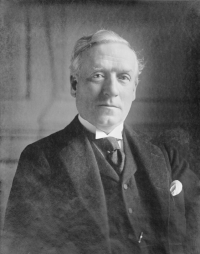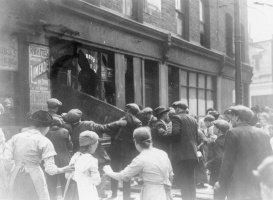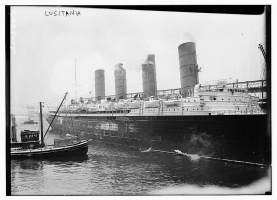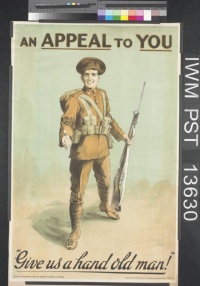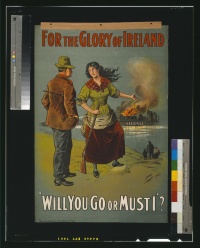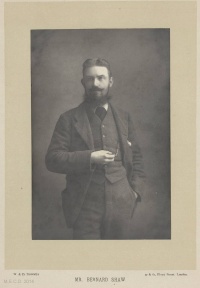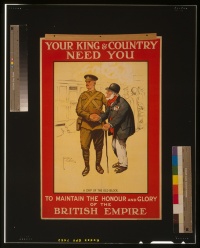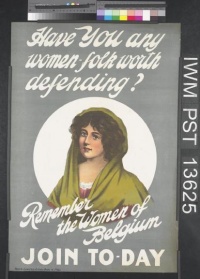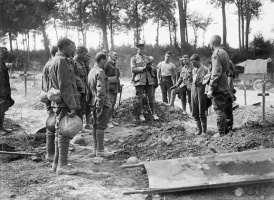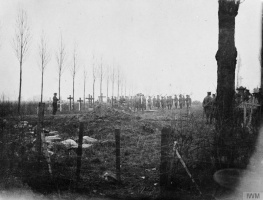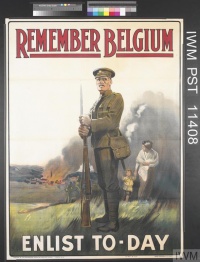Introduction↑
The German invasion of Belgium began on the morning of 4 August 1914, despite the ultimatum issued to the German authorities by the British government demanding assurance that the neutrality of Belgium be respected. When the ultimatum expired at 11pm GMT on 4 August, the United Kingdom of Britain and Ireland (the state formation that would exist until 1922) declared war on Germany and entered a dynamic of violence, hardship, and sacrifice that its population would endure for nearly four and a half years.
The decision to go to war is not the same as the causes of war.[1] Even as late as 24 July, the British Prime Minister Herbert Henry Asquith (1852-1928) believed there was no reason why Britain should be “more than spectators” in the looming conflict.[2] Ostensibly, Britain did not have a clearly identifiable “cause” to go to war with Germany in 1914. It had not been attacked or threatened directly. Pre-war agreements and discussions had not committed Britain to support France in the event of war on the continent. In fact, the existing sense of allegiance and cultural affiliation between Britain and Germany in the years immediately preceding the outbreak of war exacerbated the sense of shock amongst both populations when they discovered they were at war with each other. Furthermore, how could a Liberal government, elected in a landslide victory in 1906 in the post-South African War context of reappraising the rationale of armed conflict, be ready to go to war again? How was this justified? And how did the populations of Britain and Ireland, who would have to endure the conflict, make sense of their new world?
“Poor Little Belgium”?↑
While some Liberal cabinet members expressed doubt about the legitimacy of intervening in a war on the side of France or Russia, many felt that Britain was morally bound to honour its commitment to France, and also needed to maintain good relations with Russia and protect its maritime interests.[3] Standing by while France was toppled as a great power would undermine Britain’s sense of honour and its future security, as well as potentially jeopardising the existence of the British Empire.[4]
However, these reasons were not easily communicated to the general public which, even as late as the last week in July, still clung to the hope that Britain would remain neutral. The German invasion of Belgium helped to clarify a complex and potentially hypocritical situation. Now the British government could frame its decision to go to war as a matter of principle. The Treaty of London, signed in April 1839, committed all the great powers to recognize and protect Belgian independence and neutrality. Britain was obliged to honour its commitment and to prevent a small and pacifist country from being trampled by an invading aggressor. For many, particularly the more radical Liberals, this became Britain’s fundamental casus belli – or perhaps more accurately, its casus foederis. The final choice to enter the war, even if it was to uphold the existing balance of power, could be easily presented in moral terms.
As Sophie de Schaepdrijver argues, the invasion of Belgium rapidly became “the burning international question.”[5] By judging Germany for its treatment of Belgium, contemporaries were automatically deciding how they viewed Germany in the conflict more generally. Those who supported Germany constructed the invasion as an act of self-defence against a trouble-making Belgium manipulated by Britain and France. A condemnation of its actions contained assumptions of Germany’s war guilt. British propagandists emphasized the idea of an innocent small nation, invaded by a larger bully who had tossed away a recognised international agreement as a “scrap of paper” as much as possible.[6] Stories of atrocities, some exaggerated but many later proven to be true, added fuel to the fire. Soon the Allies were portraying Germany as a barbaric, uncivilised enemy. Arguments evolved from focusing on the German invasion of Belgium to emphasizing the very idea of Belgium itself and what it represented. “Remember brave little Belgium” rapidly became a rallying cry of the Allies. In Britain, in particular, the small state became the living embodiment of the right-against-might values that the armed forces were ostensibly fighting to preserve.
Mobilization from “Above”↑
On 6 August 1914, Asquith attempted to persuade the House of Commons of the indefatigable efforts made, in particular by the Foreign Secretary, Sir Edward Grey (1862-1933), to secure peace in the face of German aggression. Ultimately, he insisted, the war had been forced upon Britain. It was only right and honourable that it would come to the defence of Belgium and remain loyal to its ally France. Britain had thus entered the war with a clear conscience.
The key ideas expressed in this speech – national honour, rule of law, justice, the rights of small nations, fair play, and standing up to bullies – were reiterated in pamphlets and other literature, public lectures, newspaper editorials, and speeches throughout 1914. Historians, amongst many other groups, mobilized – voluntarily – to grapple with the question of why Britain was at war. For them, while Britain’s commitment to small nations was important, the deciding factor had been Britain’s long-standing obligation to France. No section of society was denied the opportunity to engage with the justifications for war in 1914, including its youngest members. The war was most commonly presented as a moral crusade in juvenile literature. One of the earliest examples, published in the autumn of 1914, was Elizabeth O’Neill’s (1877-1951) The War, 1914: A History and an Explanation for Boys and Girls. She neatly summarised the war as a chivalric struggle against the forces of evil. Other publications targeted at children used the analogy of a schoolyard promise; Germany had broken its promise to Belgium, and Britain was doing the honourable thing by coming to the defence of Belgium and France. Perhaps the clearest example of official attempts to mobilize the British population from “above” is with regards to recruitment. Owing to pre-war hostility to conscription, the British army’s strength could only be increased (for the first two years of the war at least) by persuading men to volunteer. The all-party recruitment campaign was, therefore, the most important forum in which the national cause was defined. Patriotism, duty, honour, freedom, international law, equality, humanitarianism, amongst many other themes, were communicated via an array of recruitment posters and pamphlets accompanied by powerful slogans, such as “for King and Country” and details of how to enlist.
British society in 1914 was still predominantly Christian, although practices and beliefs were certainly changing.[7] As Europe fell apart during the late summer of 1914, many people turned to organised religion, a traditional source of comfort during times of crisis. In all denominations church attendance surged for a few weeks at the outset of the conflict, as people identified with the justness of Britain’s cause and sought solace in and guidance from the churches. A vast repertory of religious and spiritual values became available with which to frame the conflict. Similar rhetoric echoed across pulpits in Britain and Ireland, emphasising the righteousness of Britain’s cause.[8] Catholic leaders were inspired to support the war because of their allegiance to Catholic Belgium. Many saw their position consolidated by the destruction of the historic library at the University of Louvain on 26 August. In Wales, widespread support for the war by both the Established and Nonconformist Churches undoubtedly helped to persuade public opinion to support the war. Methodist ministers in Cornwall preached that the war was a just crusade and that it was a necessary purge of the human soul. Similar rhetoric was espoused by Scottish Presbyterian church leaders. British Jews were implored to support the war in order to crush perceived German militarism once and for all, enabling Jews to live across Europe without menace to their political, civil, and religious rights.[9]
Mobilization from “Below”↑
Importantly, in the context of evolving British interpretations of the conflict, state-dominated does not mean state-directed. Jay Winter highlights the dual character of First World War propaganda, much of which has been discredited as lies in the post-war period. Its power lay in its synergistic relationship with opinion formed from below. As with any successful advertising campaign, messages of honour, duty, sacrifice, and avenging an aggressive bully were only going to carry weight if they made sense to the target audience. If the content of the propaganda diverged from common sense, the official message could seem hollow or simply vanish. Its power lay in the way it echoed ideas that already existed amongst the general population.[10] Although propaganda and censorship were part of public discourse, the British saw the war as they did not because of government control and manipulation, but because that was how they wished to see it.[11]
Overall, the reasons why Britain was at war permeated the minds of the British population regardless of class or religion. This is not to deny the existence of a minority of dissenters who opposed the war in 1914 on political or pacifist grounds, such as Sylvia Pankhurst (1882-1960), Bertrand Russell (1872-1970) and George Bernard Shaw (1856-1950). But the vast majority of people understood and accepted that Britain was at war to defend international law, civilization, justice, morality and freedom. Britons were not brainwashed into believing Britain’s cause was just. The content of contemporary diaries and letters demonstrate that ordinary people expressed similar ideas and used the same language employed in official speeches and pamphlets. This holds true across all regions and most levels of society.[12] For the majority of British citizens, the violation of Belgium was a just reason to be at war with Germany. In fact, the more wrongs Germany seemed to commit, the more righteous Britain’s cause became; it rapidly became impossible to consider anything other than the total defeat of the enemy.
While “mobilization” is traditionally understood in military and economic terms, it was not simply a process enacted by the state. Cultural mobilization – the mobilizing of contemporary minds, ideas and cultures – while less tangible, was nonetheless a crucial aspect of national mobilization.[13] Grass-roots initiatives were spontaneously enacted to organize society behind the war effort. The First World War prompted a new wave of voluntary activity and the foundation of many charities that provided for victims of war – whether servicemen, their families, or refugees. Nearly 18,000 charities were established in Britain during the conflict.[14] A good example of the British population, immediately self-mobilizing to support the national cause, can be seen in initial efforts to help Belgian refugees. Between 160,000 and 265,000 refugees found shelter in the UK during the First World War. They were depicted as both stoic victims of German barbarism and as a desperate people in need of help. More than 2,500 committees emerged in Britain to provide charitable relief to Belgian refugees, overseen by the War Refugees Committee (WRC), a voluntary body set up in August 1914.[15] On 24 August national newspapers carried the Committee’s first public appeal. The response was overwhelming. Within two weeks the organization was in a position to offer hospitality to almost 100,000 displaced persons. British goodwill towards the refugees was to continue throughout 1914 (although when the refugees showed little sign of going home, complaints began to surface about their intolerable demands and ingratitude).[16] In early August 1914, a fund-raising campaign, named “The Belgium Relief Fund”, was launched to help those who remained in Belgium. On 14 August, the Belgian Ambassador in London wrote to The Times to thank the British people for their generous response: “the touching sympathy of the British public will move the hearts of my Sovereign and his subjects.”[17] For most of the population, fundraising – much like volunteering – became a key feature of the British experience of war. Local newspapers carried details of money and goods collected through dances, fetes and sales of produce and work. In the streets, posters advertised wartime charities, and women sold lapel-pin flags from trays. Picture postcards were sold to raise funds. This was all evidence of the populations’ acceptance of the validity and righteousness of Britain’s cause.
A voluntary acceptance of the “ideas of 1914” did not always manifest itself in practical, positive support for victims of war. Making sense of the war also involved establishing clear definitions of friend and foe. Reports of German atrocities were believed by many British people in 1914 and galvanised people into violent action against pockets of the approximately 53,000 German immigrants in Britain at the outbreak of war. A cluster of major riots occurred between 14 and 24 October, in part as a response to the news of the fall of Antwerp, and thus most of Belgium, on 10 October. Patriotic singing and booing targeted at shops or property with a German connection (and those residing inside) rapidly descended into stone throwing, smashing of windows, and looting. The British also self-mobilized to defend against suspected spies, a period which historians have appropriately described as “spy fever”. Anything German was regarded with contempt, and anyone thought to have the least sympathy with the Germans was accused of espionage. People believed that enemy spies had been heard of, seen, or even captured across the length and breadth of the United Kingdom. By 20 September the War Office was begging the Home Office to stop the wave of arrests because there was no more room to house the prisoners.[18] In his report for the year ending 31 December, the Chief Constable of Edinburgh City police, Roderick Ross (1865-1943), described how he had received “a lot more letters and reports…since the outbreak of the war” from loyal citizens who were “energetic in at once communicating anything of a suspicious nature which may have come to their notice.”[19]
Ireland↑
One of the major differences in the experience of entering and making sense of the war in 1914 between Britain and France and Germany was the complex domestic political situation in the United Kingdom. While in Britain most of the leaders of the labour and suffragette movements had agreed to temporarily suspend their causes and rally behind the national effort for the duration of the war, such loyalty was not guaranteed in Ireland. On the very eve of the British declaration of war on Germany, the military wings of the Ulster unionist and Irish nationalist organisations squared up to each other, while British officers stationed in Ireland had indicated during the so-called “Curragh Mutiny” in March that they would not enforce the wishes of their government if unionists attempted to prevent the introduction of Home Rule.
John Redmond (1856-1918), leader of the Irish Parliamentary Party – representative of the majority of Irish nationalists in 1914 – was strongly in favour of supporting the war effort. At first this was limited to defending the shores of Ireland against foreign attack. However, by 20 September, at a gathering of Irish National Volunteers at Woodenbridge Co. Wicklow, he confirmed the extension of Irish support to “wherever the firing line extends”.[20] Significantly, Redmond’s September extension fractured the volunteer movement, splitting it in two. Although the majority remained loyal to Redmond and contributed a steady stream of recruits to the British Army, the minority, consisting of the more extreme members, broke away to form their own force. In the long-term, it would be this minority of advanced nationalists who would become the architects of a revolutionary conspiracy to which the whole concept of Home Rule was irrelevant.
However, following the outbreak of war, dissidence in Ireland was constrained by the support for the war demonstrated by the majority of Irish people. Any dissent amongst advanced Irish nationalists was limited. While this was, in part, because of a strategic calculation that support for the war and loyalty to Britain would aid the cause of Irish independence in the long term, it was, to a larger extent because the Irish shared with their British comrades an understanding of what was at stake in the war – national honour, liberty, and the rights of small nations. The sovereignty of small nations was particularly compelling to the Irish, and an intense feeling for Belgium and its sufferings was amplified by their religious (Catholic) affiliation. Many Irish people responded to the war by immediately offering their time and skills to philanthropic activities in support of the war and its victims. For nationalists, this type of voluntary work was particularly conducive, owing to any reservations they may have had about serving in the British uniform. That said, over 140,000 Irish men volunteered to serve in the British Army during the war.[21] Just as in Britain, not only were the Irish able to build a picture of what they were fighting for, they simultaneously constructed images of the German enemy they were fighting against. In mid-August a wave of attacks on German pork butchers’ shops in Dublin confirmed that feelings of fear and hatred towards the enemy were shared across the United Kingdom of Britain and Ireland.[22]
Redemption by Victory↑
British and Irish understandings of the war evolved over the course of four and a half years of conflict. For many British and Irish civilians, ideas and imaginings of the war that had emerged at its outset were reinforced as the war progressed. The view of the war as a righteous crusade, for example, was confirmed for many in 1915 when British and Irish civilians were killed in the U-boat campaigns, air-ship raids, and coastal bombardments directed by the German military. The inhumanity of the sinking of the Cunard liner, the Lusitania, on 7 May 1915, just off the coast of Ireland, shocked the civilized world and added immeasurably to the moral fervour of the Allied cause. It further confirmed that civilians were as much targets as combatants in this conflict and heightened the sense that the enemy was a force of malevolent depravity that simply had to be defeated. In addition, as military losses mounted, the belief that the war was an “all or nothing” campaign of good against evil solidified. The only way to redeem sacrifices made on the battlefront was to achieve absolute victory in the face of this abhorrent enemy. The extremely high death-tolls suffered by the British forces – and by volunteers in particular – at Gallipoli in 1915, the Somme in 1916, and Third Ypres in 1917 all significantly increased instances of civilian bereavement and in turn enhanced the popular view that the debt to the dead had to be redeemed by victory.
While Irish civilians were not immune to such experiences of total war, the situation became more complex in the period following the armed nationalist rebellion in 1916, commonly referred to as the Easter Rising. Crucially, the Rising itself stemmed from an awareness amongst advanced nationalists that Irish men were facing the same threat as British men; that the armed forces could no longer be replenished by volunteerism alone and that men would now be compelled to fight. Conscription was threatening to replace persuasion. This was an unpalatable situation for most Irish people who may have supported the British cause in the war, but were not willing to die for a country that refused them their rights as a sovereign nation. Conscription was never introduced in Ireland – it was deemed too politically sensitive – but neither did Ireland make an early exit from the war. Even after the Rising, the British were still able to obtain a large number of recruits from Ireland via negotiated persuasion rather than compulsion. In addition, many more Irish civilians continued to make valuable contributions to the war effort in terms of the economy and charitable work. These people were responding and responsive to messages regarding the legitimacy of the UK’s position in the war. They believed the war was worth fighting and that, despite their increasing animosities towards British rule, Germany needed to be defeated.[23]
Conclusion↑
One hundred years after the outbreak of a war that resulted in catastrophic military and civilian casualties worldwide, it is difficult to accept that the conflict, in 1914, was supported by consenting populations that believed it to be a just war.[24] This scepticism is compounded in Britain and Ireland (and elsewhere) by more recent experiences of warfare that has tainted the just war tradition as a spurious device for justifying military action that would be undertaken anyway.[25] Politicians from both Britain and Ireland who have spoken publicly during the centenary commemorations about the war being a struggle of “right” against “might” have faced resistance from the public and popular media. In January 2014, former British Secretary of State for Education, Michael Gove, asserted that Britain was right to enter the conflict in 1914.[26] This triggered a month-long debate in the press, drawn along political trench lines: those on the right proclaiming the First World War to be a patriotic, just war against German aggression; those on the left decrying it as a futile slaughter of the British working classes for imperialist aims.[27] Similarly, former Taoiseach (Irish prime minister), John Bruton, argued in October 2014 that the Irish, in 1914, believed the unprovoked invasion by Germany of a small neutral country, Belgium, in order to attack France, to be profoundly wrong and deserving of opposition. He was swiftly criticised by those on the left, including the president of Sinn Féin, Gerry Adams.[28]
However, it is important to remember that history, while written in retrospect, is lived forwards. Historians must try to recapture what was known and felt during the war as accurately as possible, rather than imposing assumptions in the light of what happened later. The evidence indicates that while most people hoped war could be avoided, in the face of German aggression and aware of the promises Britain had made to Belgium and France, they accepted that it was justified. People generally believed that the British army was fighting against a despotic and barbaric enemy that threatened the very values upon which the United Kingdom was founded. The war embodied a moral crusade, in which the cost of defeat was a price too heavy to bear. This is how people made sense of the war. It was not only echoed in official discourse, such as pamphlets, recruiting speeches, editorials and sermons, but was also restated in layman’s terms – in Music Hall songs, imagery, conversations, diaries and letters. It also manifested itself in public behaviour, as men enlisted and those who could not fight rallied around voluntary efforts to support victims of war. It also was apparent in the more negative expression of violence towards the perceived enemy within.
Catriona Pennell, University of Exeter
Section Editor: Edward Madigan
Notes
- ↑ Offer, Avner: Going to War in 1914. A Matter of Honour?, in: Politics and Society 23/2 (1995), p. 213.
- ↑ Asquith, Margot: Margot Asquith’s Great War Diary 1914-1916. The View from Downing Street, Oxford 2014, p. lxviii.
- ↑ In response to Britain’s declaration of war, three members of government resigned in protest and a further three declared their intention to resign (although they were eventually persuaded to stay). Pennell, Catriona: A Kingdom United. Popular Responses to the Outbreak of the First World War in Britain and Ireland, Oxford 2012, p. 45.
- ↑ Asquith, Asquith’s Great War Diary 2014, p. lxviii.
- ↑ De Schaepdrijver, Sophie: Occupation, Propaganda and the Idea of Belgium, in: Roshwald, Aviel / Stites, Richard (eds.): European Culture in the Great War. The Arts, Entertainment and Propaganda, 1914-1918, Cambridge 1999, p. 267.
- ↑ See, for example, Parliamentary Recruiting Poster No. 7. 4921-14 published in 1914: http://www.iwm.org.uk/collections/item/object/30237, accessed 17 November 2014.
- ↑ Gregory, Adrian: The Last Great War. British Society and the First World War, Cambridge 2008, pp. 178–79.
- ↑ Pennell, A Kingdom United 2012, p. 62; Morgan, Dafydd David: ‘Christ and the War’. Some Aspects of the Welsh Experience, 1914-1918, in: Journal of Welsh Religious History 5 (1997), p. 74.
- ↑ Pennell, A Kingdom United 2012, p. 63. See also Madigan, Edward: Faith Under Fire. Anglican Army Chaplains and the Great War, Basingstoke 2011, pp. 34–42.
- ↑ Winter, Jay: Propaganda and the Mobilization of Consent, in: Strachan, Hew (ed.): The Oxford Illustrated History of the First World War, Oxford 2000, p. 217.
- ↑ Hiley, Nicholas: The News Media and British Propaganda, 1914-1918, in: Becker, Jean Jacques/Audoin-Rouzeau, Stéphane: Les Sociétiés Européenês et La Guerre de 1914-1918, Nanterre 1990, p. 177.
- ↑ Pennell, A Kingdom United 2012, pp. 64–65.
- ↑ Horne, John: State, Society and Mobilization in Europe During the First World War, Cambridge 1997, pp. 1–17; see also Siebrecht, Claudia: The Aesthetics of Loss. German Women’s Art of the First World War, Oxford 2013, p. 25.
- ↑ Harris, Carol: 1914-1918. How charities helped to win WW1, issued by: The Third Sector, 27 June 2014, online: http://www.thirdsector.co.uk/1914-1918-charities-helped-win-ww1/volunteering/article/1299786 (retrieved: 19 November 2014).
- ↑ Gatrell, Peter: ‘Europe on the move. Refugees and World War One, issued by: The British Library, online: http://www.bl.uk/world-war-one/articles/refugees-europe-on-the-move#footnote2 (retrieved: 19 November 2014).
- ↑ Pennell, A Kingdom United 2012, pp. 136–138.
- ↑ LALAING. Belgian Relief Fund. Times [London, England] 14 Aug. 1914, p. 7. The Times Digital Archive. (retrieved: 19 November 2014).
- ↑ French, David: Spy Fever in Britain, 1900-1915, in: The Historical Journal 21/2 (1978), pp. 367–8.
- ↑ Edinburgh Central Library: Chief Constable’s Annual Reports: HV 8198, February 1915.
- ↑ Bruton, John: September 1914. John Redmond at Woodenbridge, in: Studies: An Irish Quarterly Review, 101/402 (2012), p. 237.
- ↑ Callan, Patrick: Recruiting for the British Army in Ireland during the First World War, in: The Irish Sword 17/66 (1987), pp. 42–56.
- ↑ Pennell, A Kingdom United 2012, pp. 168–173.
- ↑ Pennell, Catriona: Presenting the War in Ireland, 1914-1918, in: Paddock, Troy R.E. (ed.): World War I and Propaganda, Leiden 2014, pp. 42–64.
- ↑ Prost, Antoine: War Losses, in: 1914-1918-online. International Encyclopedia of the First World War, ed. by Ute Daniel, Peter Gatrell, Oliver Janz, Heather Jones, Jennifer Keene, Alan Kramer, and Bill Nasson, issued by Freie Universität Berlin, Berlin 2014-10-08. DOI: http://dx.doi.org/10.1546333/ie1418.10271.
- ↑ Fisher, David: Was Iraq a Just War?, issued by: OUP blog, 20 May 2011, online: http://blog.oup.com/2011/05/just-war/ (retrieved: 28 November 2014).
- ↑ Shipman, Tim: Michael Gove blasts “Blackadder myths” about the First World War spread by television sit-coms and left-wing academics, 2 January 2014, online: http://www.dailymail.co.uk/news/article-2532923/Michael-Gove-blasts-Blackadder-myths-First-World-War-spread-television-sit-coms-left-wing-academics.html (retrieved: 28 November 2014).
- ↑ Jones, Heather: Memory and Meaning in the Commemoration of the First World War, in: Juncture 20/4 (2014), online: http://www.ippr.org/juncture/memory-and-meaning-in-the-commemoration-of-the-first-world-war (retrieved: 28 November 2014).
- ↑ McGreevy, Ronan: John Redmond a “man of violence”, says Gerry Adams, in: Irish Times, 22 October 2014, online: http://www.irishtimes.com/news/ireland/irish-news/john-redmond-a-man-of-violence-says-gerry-adams-1.1972906 (retrieved: 28 November 2014).
Selected Bibliography
- Callan, Patrick: Recruiting for the British Army in Ireland during the First World War, in: The Irish Sword 17/66, 1987, pp. 42–56.
- De Schaepdrijver, Sophie: Occupation, propaganda and the idea of Belgium, in: Roshwald, Aviel / Stites, Richard (eds.): European culture in the Great War. The arts, entertainment, and propaganda, 1914-1918, Cambridge; New York 1999: Cambridge University Press, pp. 267-294.
- French, David: Spy Fever in Britain, 1900-1915, in: The Historical Journal 21/2, 1978, pp. 355-370.
- Gregory, Adrian: The last Great War. British society and the First World War, Cambridge; New York 2008: Cambridge University Press.
- Hiley, Nicholas: The news media and British propaganda, 1914-1918: Les Sociétiés Européenês et La Guerre de 1914-1918, Nanterre 1990: Université de Paris X.
- Horne, John / Kramer, Alan: German atrocities 1914. A history of denial, New Haven 2001: Yale University Press.
- Jenkins, Philip: The great and holy war. How World War I changed religion forever, Oxford 2014: Lion.
- Joll, James: 1914, the unspoken assumptions, London 1968: London School of Economics and Political Science; Weidenfeld & Nicolson.
- Kennedy, Rosie: The children's war. Britain, 1914-1918, Basingstoke 2014: Palgrave Macmillan.
- Offer, Avner: Going to war in 1914. A matter of honour?, in: Politics and Society 23/2, 1995, pp. 213-41.
- Pennell, Catriona: A kingdom united. Popular responses to the outbreak of the First World War in Britain and Ireland, Oxford 2012: Oxford University Press.
- Pennell, Catriona: Presenting the war in Ireland, 1914-1918, in: Paddock, Troy R. E. (ed.): World War I and propaganda, Leiden 2014: Brill, pp. 42-64.
- Strachan, Hew: The First World War. To arms, volume 1, Oxford 2001: Oxford University Press.
- Strandmann, Harmut Pogge von: The role of British and German historians in mobilizing public opinion in 1914: British and German historiography, 1750-1950. Traditions, perceptions, and transfers, Oxford; New York 2000: Oxford University Press.
- Wallace, Stuart: War and the image of Germany. British academics, 1914-1918, Edinburgh 1988: J. Donald Publishers.
- Winter, Jay: Propaganda and the mobilization of consent, in: Strachan, Hew (ed.): The Oxford illustrated history of the First World War, Oxford 2000: Oxford University Press.





